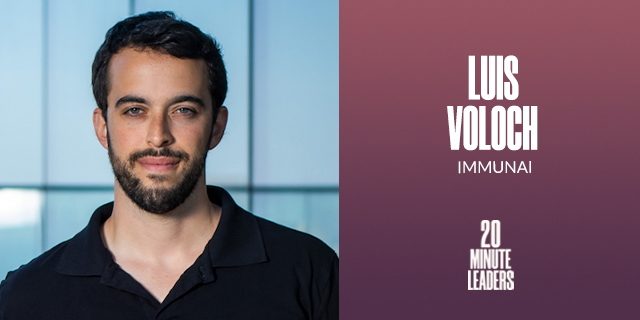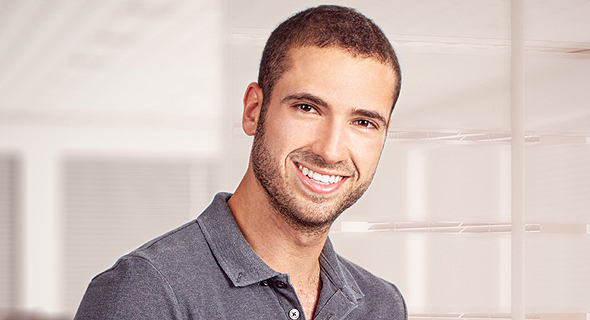
20-Minute Leaders
“The intersection of machine learning and biology is the future, and we want to be one of the first companies really helping push that forward.”
Luis Voloch joins Michael Matias to discuss how Immunai is reprograming our immune systems and improving the biology of our bodies
CTech | 08:33, 08.06.21
It is not often when an entrepreneur with an idea to improve our lives can literally improve the biology of our bodies, but that is exactly what Luis Voloch and his co-founder Noam Solomon at Immunai are doing. Combining machine learning and biology, they are working to não and reprogram our immune systems by applying knowledge about certain cancers, for example, to other forms of cancer. The company currently works with various pharmaceutical companies to help them develop, improve, and combine their drugs, but Voloch has goals of helping people understand their immune systems better beyond cancer as well, and onto fighting autoimmune and age-related diseases as well. To reach their goals, they have hired the best and the brightest they can find in fields such as software, computational biology, and immunology. Other crucial characteristics for Immunai’s hires are that they are very curious about the other disciplines and want to learn and work together.
Click Here For More 20MinuteLeaders
How did you grow up as an engineer, as an entrepreneur? What framed your mind-set as you went through your journey? I grew up in Brazil originally, in Rio de Janeiro, and I lived there until I was 16. I think a lot of what I did in my childhood was a mix of basketball with math. It turned out that my height projections were wrong, which made me give up basketball, not math. I moved to the US, and I went to MIT for my first degree and second degree as well as starting my Ph.D. I’ve always been very interested in math, science, and computer science, as well as how it relates to the world. I think those are sort of my core passions. What is it about the subject and about the work that you're doing within the mathematical context that just really excites you? I think what I always liked about math is that it forced me to be thorough. There's just no way around it. Really the only way is to deeply understand things and think about things extremely critically and in a structured way. That's the only way that things move forward. And I think that's one of the things that really attracted me to math. Entrepreneurship is different in the sense that you do need to make bold decisions that are not necessarily fully cooked, but I am just trying to be as thorough as possible. How did you and Noam Solomon meet, and what were you aiming for? One of the things that I bonded very quickly with Noam over was math, and unlike me, who dropped out of a math career, he actually succeeded in it for a while, and he's an amazing mathematician. Another part we shared very much is we're both thorough, but at the same time we also want to have a major impact in the world. Very early on, we started to understand that we wanted to have the broadest possible impact. We wanted something that we have the competitive advantage on and also something that really helped improve lives. You're literally improving lives, our biology. Yes. Very early on, we made that decision to work with biological data. I think it's some of the most interesting things you can do with machine learning these days. The data scale is huge. The applications are amazing. It's very high-dimensional. There's so many features working with biological data that you just can't have somewhere else. And I think a lot of what built us as a company is this thesis that the intersection of machine learning and biology is the future, and we want to be one of the first companies really helping push that forward. Can you share with me a few statistics on the team, the type of people that you're hiring and their backgrounds? I think it's one of the things we're definitely the proudest of. The software team is about half Talpiot graduates, and the other ones are also ex-Google and Palantir and places like that. In our computational biology team, two-thirds are PhDs or postdocs from either Berkeley, Stanford, Weizmann Institute, MIT, or Harvard. In our lab team, it's essentially like the same kind of background in terms of immunology and genomics, but one of the crucial things for us is not just bringing people that are excellent in their respective fields but that they are people that deeply share this commitment to be multidisciplinary. Having this habit of going so out of your comfort zone in terms of learning and in terms of collaboration is one of the most important things. And I think that's one of the main cultural aspects of Immunai is all these people that are really the best in their respective areas, but they're just so interested in everything else that's going on, and they want to learn and they want to collaborate. What is it like leading a team like this? Do you feel any difference? It's really an honor in a way to be working with this team. It’s a very nice, first of all, and a collaborative and very talented team. We don’t have many people issues; everyone's very collaborative and nice. Leading a team like that, in my definition, is essentially just helping set the context for what we are doing and just making sure that the team dynamics are right and essentially letting them run the show. We want as many of the decisions being taken not to be taken by me or the co-founders or the usual people; we want as many of the decisions to be taken by the people that are doing the work. Having 50 amazing people coming up with ideas and making decisions is much more powerful than having three. Can you give me a brief rundown of what problem are you solving here and why is this the best time to do it? What is Immunai? One of the methodologies in machine learning that Noam and I really wanted to make into a reality in immunology is this concept of transfer learning. This allows you to take learning in one problem and transfer it out systematically as the data and as models to other problems. One of the things that we are doing in Immunai is doing this for the immune system. The immune system is a central player driving all kinds of defense against diseases, and there are all these commonalities in how the immune system is supposed to be defending you against different cancers, autoimmune diseases, and aging-related diseases. There's a lot in common across all of them. At Immunai, seeing them from the top of a tree in a way, we can take these learnings from lung cancer and from bladder cancer and transfer them to melanoma. One of things we're doing now is trying to develop the next generation of therapeutics that leverages that. How does that tangibly work? How does this actually get translated into real-world circumstances and impact that could potentially now reach a billion people? We partner with specific pharma companies on specific drugs or diseases. So, for example, we might have a partnership with the immune components of diabetes with the specific pharma company for their drug, and we help them improve their drug. Then, we share some of the economics downstream of that try. Each benefits in their own way. Five years down the line, what is the world like? How has Immunai changed the way that I live my life? I would say it will be much clearer how your immune system is keeping you young and keeping you healthy, and that essentially we would like not just to make better drugs for diseases, but that everyone understands that the immune system is the core of their health and that it's really what's keeping you young and healthy and free from diseases. So our vision extends from building better drugs for cancer, to autoimmune diseases, all the way into aging-related diseases. The most important thing is keeping people healthy. We want Immunai to be the company that is helping put this entire puzzle together and helping sick people, helping healthy people live better lives. What are three words you would choose to describe yourself? It’s open, bold, and interested.Michael Matias, Forbes 30 Under 30, is the author of Age is Only an Int: Lessons I Learned as a Young Entrepreneur. He studies Artificial Intelligence at Stanford University, while working as a software engineer at Hippo Insurance and as a Senior Associate at J-Ventures. Matias previously served as an officer in the 8200 unit. 20MinuteLeaders is a tech entrepreneurship interview series featuring one-on-one interviews with fascinating founders, innovators and thought leaders sharing their journeys and experiences.
Contributing editors: Michael Matias, Amanda Katz
